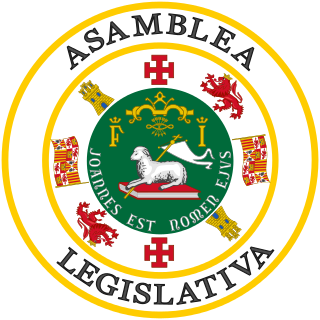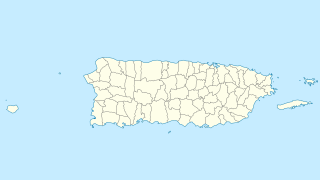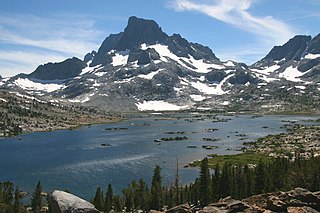
The politics of Puerto Rico take place in the framework of a democratic republic form of government that is under the jurisdiction and sovereignty of the United States as an organized unincorporated territory.

The Foraker Act, Pub.L. 56–191, 31 Stat. 77, enacted April 12, 1900, officially known as the Organic Act of 1900, is a United States federal law that established civilian government on the island of Puerto Rico, which had recently become a possession of the United States as a result of the Spanish–American War. Section VII of the Foraker Act also established Puerto Rican citizenship. President William McKinley signed the act on April 12, 1900 and it became known as the Foraker Act after its sponsor, Ohio Senator Joseph B. Foraker. Its main author has been identified as Secretary of War Elihu Root.

The Federal Government of the United States is the national government of the United States, a federal republic in North America, composed of 50 states, a federal district, five major self-governing territories, and several island possessions. The federal government is composed of three distinct branches: legislative, executive, and judicial, whose powers are vested by the U.S. Constitution in the Congress, the President, and the federal courts, respectively. The powers and duties of these branches are further defined by acts of congress, including the creation of executive departments and courts inferior to the Supreme Court.

El Yunque National Forest, formerly known as the Caribbean National Forest, is a forest located in northeastern Puerto Rico. It is the only tropical rain forest in the United States National Forest System and the United States Forest Service

Territories of the United States are sub-national administrative divisions overseen by the federal government. They differ from U.S. states and Native American tribes, which have limited sovereignty. The territories are classified by incorporation and whether they have an "organized" government through an organic act passed by Congress.
In the terminology of the United States insular areas, a Commonwealth is a type of organized but unincorporated dependent territory. There are currently two United States insular areas with the status of commonwealth, the Northern Mariana Islands and Puerto Rico.

The Legislative Assembly of Puerto Rico is the territorial legislature of the Commonwealth of Puerto Rico, responsible for the legislative branch of the government of Puerto Rico. The Assembly is a bicameral legislature consisting of an upper house, the Senate normally composed by 27 senators, and the lower house, the House of Representatives normally composed by 51 representatives. Eleven members of each house are elected at-large rather than from a specific legislative district with all members being elected for a four-year term without term limits.
The National Forest Act, the name of several United States federal laws, may refer to:

The Jones–Shafroth Act —also known as the Jones Act of Puerto Rico, Jones Law of Puerto Rico, or as the Puerto Rican Federal Relations Act of 1917— was an Act of the United States Congress, signed by President Woodrow Wilson on March 2, 1917. The act superseded the Foraker Act and granted U.S. citizenship to anyone born in Puerto Rico on or after April 25, 1898. It also created the Senate of Puerto Rico, established a bill of rights, and authorized the election of a Resident Commissioner to a four-year term. The act also exempted Puerto Rican bonds from federal, state, and local taxes regardless of where the bond holder resides.

Pedro Rafael Pierluisi Urrutia is an attorney who was the 19th Resident Commissioner of Puerto Rico from 2009 to 2017. In this capacity, Pierluisi served as a member of the United States House of Representatives and as the only delegate that represents all U.S. citizens residing on the island. His constituency encompassed about 3.3 million people and, unlike most others, belongs to an at-large congressional district that covers his entire domicile rather than a subdivision of it. Pierluisi's rights and privileges differed from other congressmen as well, as he is denied a vote on the final disposition of all legislations on the House floor because of his designation as resident commissioner. Still, save for that exception, he exercised his functions like that of any other congressman. He has Italian ancestry.
The Puerto Rico Statehood Students Association (PRSSA) —Spanish: Asociación de Estudiantes Estadistas de Puerto Rico— is a Puerto Rican non-profit student organization dedicated to promoting statehood for Puerto Rico. Founded in 1979, the organization has grown to more than 5,000 members and 70 chapters at colleges and universities in over 20 states of the United States, the District of Columbia, and Puerto Rico. Its headquarters are located in San Juan, Puerto Rico.

The following outline is provided as an overview of and topical guide to Puerto Rico:

The Puerto Rico Democracy Act is a bill to provide for a federally sanctioned self-determination process for the people of Puerto Rico.

The political status of Puerto Rico is that of an unincorporated territory of the United States. As such, the island is neither a sovereign nation nor a U.S. state. Because of that ambiguity, the territory, as a polity, lacks certain rights but enjoys certain benefits that other polities have or lack. For instance, in contrast to sovereign nations, Puerto Rico does not have voting rights in its federal legislature nor in electing its federal head of government. But, in contrast to U.S. states, residents of Puerto Rico are not subject to federal income taxes. The political status of the island thus stems from how different Puerto Rico is politically from sovereign nations and from U.S. states.
The proposed political status for Puerto Rico encompasses the different schools of thought on whether Puerto Rico, currently a Commonwealth of the United States, should change its current political status. Although there are many differing points of view, there are four that emerge in principle: that Puerto Rico maintains its current status, becomes a state of the United States, becomes fully independent, or becomes a freely associated state.

Law 53 of 1948 better known as the Gag Law, was an act enacted by the Puerto Rico legislature of 1948, with the purpose of suppressing the independence movement in Puerto Rico. The act made it a crime to own or display a Puerto Rican flag, to sing a patriotic tune, to speak or write of independence, or to meet with anyone or hold any assembly in favor of Puerto Rican independence. It was passed by a legislature that was overwhelmingly dominated by members of the Popular Democratic Party (PPD), which supported developing an alternative political status for the island. The bill was signed into law on June 10, 1948 by Jesús T. Piñero, the United States-appointed governor. Opponents tried but failed to have the law declared unconstitutional by the United States Supreme Court.
The Territories Clause of the United States Constitution allows for Congress to "dispose of" Puerto Rico and allow it to become independent of the U.S. or, under the authority of the Admissions Clause for it to be admitted as a state of the United States.
The foreign and intergovernmental relations of Puerto Rico are governed by the Commerce and Territorial Clause of the Constitution of the United States. Because of this, they are subject to the plenary powers of Congress. Nonetheless, Puerto Rico has established relations with foreign nations, particularly with Hispanic American countries such as Colombia and Panamá. The establishment of such relations, however, requires permission from the U.S. Department of State or Congress itself. Still, most relations are already set by existent laws or trade agreements established beforehand by the United States that supersede the relation pursued by Puerto Rico.

Reserva Natural Punta Cucharas is a nature reserve in Barrio Canas, Ponce, Puerto Rico. It consists of both a land area component as well as an offshore marine area. The land component has an area of 698 cuerdas while the marine component has an expanse of 3,516 cuerdas, for a total area of 4,214 cuerdas. The Reserve consists of mangrove ecosystems, coastal sand dunes, a saline lagoon known as Laguna Las Salinas, open water, and a century-old local community. The lagoon occupies and area of 347,898 m2 Ecological protection is managed and enforced by the Puerto Rico Department of Natural and Environmental Resources.











